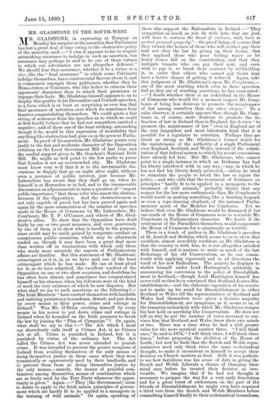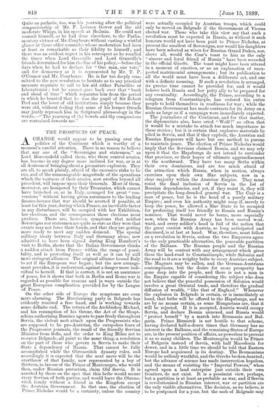MR. GLADSTONE IN THE SOUTH-WEST.
MR. GLADSTONE, in expressing at Torquay on Monday his surprise at the assertion that Parliament has lost a great deal of time owing to the obstructive policy of the minority, said :—" I own it appears to me to require astonishing assurance to indulge in such an assertion, but assurance may perhaps be said to be one of those virtues in which our adversaries are not altogether deficient." We should fear that assurance, whether it be a virtue or a vice, like the "final assurance" in which some Calvinists indulge themselves, has a controversial flavour about it, and is commonest amongst those politicians, whether they be Home-rulers or Unionists, who like better to criticise their opponents' characters than to attack their premisses or impugn their facts. Mr. Gladstone himself appears to us to display this quality in his Devonshire and Cornish speeches, in a form which is at least as surprising as ever was that final assurance of salvation over which we sometimes hear fanatics congratulating themselves. We could quote a fair string of sentences from his speeches as to which we could at first hardly believe that he had not somewhere omitted a negative ; and of these one of the least striking, astounding though it be, would be this expression of incredulity that anything like obstruction had gone on in the present Parlia- ment. In proof of his assertion, Mr. Gladstone points very justly to the fair and moderate character of the Opposition criticism on the Local Government Bill of last year, and the cordial support given to Mr. Goschen's National Debt Bill. He might as well point to the few parks to prove that London is not an overcrowded city. Mr. Gladstone must know very well that it is to the interminable dis- cussions in Supply that go on night after night, without even a pretence of public interest, just because Mr. Labouchere has sworn that they shall go on, when he himself is at Hawarden or in bed, and to the innumerable discussions on adjournments to raise a question of "urgent public importance," that those refer who assert the obstruc- tiveness of the Opposition. And the obstructiveness is not only capable of proof, but has been proved again and again by the mere enumeration of the number of speeches made in the House of Commons by Mr. Labouchere, Mr. Conybeare, Mr. T. P. O'Connor, and others of Mr. Glad- stone's allies. To show that the Opposition have dealt fairly by one or two great measures, and even generously by one of them, is to show what is hardly to the purpose, since credit may be easily gained by temperate conduct on conspicuous public occasions, which may be afterwards traded on, though it may have been a great deal more than written off in transactions with which only those who study more minutely the aspects of Parliamentary affairs are familiar. But this statement of Mr. Gladstone, extravagant as it is, is, as we have said, one of the least extravagant which he has made. He can at least plead for it, as we have admitted, the excellent conduct of the Opposition on one or two show occasions, and doubtless he has often been absent, and sometimes has congratulated himself on his absence, when his followers were at the kind of work the very existence of which he now disputes. But what shall we say to such assertions as the following The Irish Members "have exerted themselves with laudable and untiring persistency to condemn, thwart, and put down by every means in their power, crime and outrage in Ireland." Was Mr. O'Brien exerting himself by every means in his power to put down crime and outrage in Ireland when he hounded on the Irish peasants to break the law by joining the "Plan of Campaign" ? Or, again, what shall we say to this ?—" The Act which I must say shamelessly calls itself a Crimes Act, is no Crimes Act at all. Crime is punished in Ireland, but it is punished by virtue of the ordinary law. The Act called the Crimes Act was never intended to punish crime. It was intended to prevent the poorer occupiers of Ireland from availing themselves of the only means of doing themselves justice in those cases where they were tyrannically or oppressively used by their landlords, and to prevent them from so doing themselves justice by the only means,—namely, the means of peaceful com- bination among themselves, means of combination which are so freely used by the Tory Party whenever the oppor- tunity is given." Again :—" They [the Government] seem to desire to apply to the Irish nation principles of govern- ment which are hardly fit to be applied in a menagerie in the training of wild animals." Or again, speaking of those who support the Nationalists in Ireland :—" They sympathise as much as you do with laws that are just, with laws to restrain the hand of violence, with laws to protect personal property,"—the proof being, of course, that they victual the houses of those who will neither pay their rent nor obey the law by giving up their house, that they applaud those who pour boiling water or let heavy stones fall on the constabulary, and that they instigate tenants who can pay their rent, and even wish to pay it, to break their contract by withholding it, in order that others who cannot pay theirs may have a better chance of getting it reduced. Again, take this judgment of Mr. Gladstone's upon Mr. Cony beare,— one of the most startling which even in these speeches, full as they are of startling assertions, he has enunciated : —" I doubt whether there is an individual in the House of Commons who would for a moment suspect Mr. Cony- beare of being less desirous to promote the maintenance of law among ourselves than any other citizen." To a calm observer, it certainly appears that, though Mr. Cony- beare is, of course, more desirous to promote the in- fraction of law in Ireland than in England, his desires "to promote the maintenance of law" even in England are of the very languidest and most lukewarm kind that it is possible for a legislator to entertain. Perhaps they are about as strong as Mr. Gladstone's former desire for the maintenance of the authority of a single Parliament over England, Scotland, and Wales, instead of the substi- tution of that federal system to which his recent concessions have already led him. But Mr. Gladstone, who cannot point to a single instance in which an Irishman has had his liberty interfered with in any way,—nay, in which he has not had his liberty firmly protected,—unless he tried to stimulate the people to break the law or injure the police,—and who calls that the treatment of Irishmen on principles "hardly fit to be applied in a menagerie to the treatment of wild animals," probably thinks that any respect for the law more enthusiastic than Mr. Conybeare's would result in making something like a hunting leopard, or even a rope-dancing elephant, of the untamed Parlia- mentary spirit of the Member for Camborne. Yet we believe that even Mr. Gladstone would be dismayed if but one-tenth of the House of Commons were to resemble Mr. Conybeare in Parliamentary character. We doubt if the retirement of the Parnellites themselves, would compensate the House of Commons for a catastrophe so terrible.
There is a touch of pathos in Mr. Gladstone's speeches at St. Austell and Bodmin, which seems to us to show that confident, almost incredibly confident, as Mr. Gladstone is that the country is with him, he is not altogether satisfied with himself, and is anxious to make as much of the last fiickerings of his old Conservatism, as he can consis- tently with applying vigorously and in all directions the torch of his new Radicalism. The anxiety he displays to shelter himself under Lord Hartington's authority in announcing his conversion to the policy of Disestablish- ment in Scotland,—though Lord Hartington himself has never told us that he is convinced that Scotland desires Dis- establishment,—and the elaborate exposition of his resolve not to make up his mind for Disestablishment in either Scotland or Wales till the representatives of Scotland and Wales had themselves twice given a decisive majority for Disestablishment, are symptoms, as it seems to us, of the transient melancholy with which Mr. Gladstone resigns his last hold on anything like Conservatism. He does not tell us why he put the number of votes necessary to con- vince him that Scotland and Wales know their own minds at two. There was a time when he had a still greater value for the more mystical number three. "I will think once," he said in 1874," I will think twice, I will think three times," before proposing the abolition of the House of Lords ; but now he finds that the Scotch and Welsh repre- sentatives need only think twice the same ecclesiastical thought, to make it incumbent on himself to accept their decision on Church matters as final. Still, it was pathetic to see how fastidious was his sense of duty in giving the Scotch and Welsh Liberals a chance of changing their mind once before he treated their decision as irre- vocable. We imagine that if he had not thought it necessary to prepare the way for a very early dissolution and for a great burst of enthusiasm on the part of the friends of Disestablishment, he might even have required a third vote from the Scotch and Welsh Members before committing himself finally to their ecclesiastical iconoclasm Quite as pathetic, too, was his yearning after the political companionship of Mr. F. Leveson Gower and the old moderate Whigs, in his speech at Bodmin. He could not commit himself, as he had done elsewhere, to the Parlia- mentary virtues of Mr. Conybeare without casting a wistful glance at those older comrades whose moderation had been at least as remarkable as their fidelity to himself ; and there was an evident regret in his retrospect as he recalled the times when Lord Granville and Lord Granville's friends determined for him the line of his policy,—before the days when he had to declare for "One man, one vote," and for democracy as it is represented by Mr. T. P. O'Connor and Mr. Conybeare. He is far too deeply com- mitted to the new revolution to hesitate as to any practical measure requisite to call to his aid either Parnellite or Liberationist ; but he cannot gaze back over that "bank and shoal of time" which separates him from the period in which he boasted that he was the pupil of Sir Robert Peel and the lover of old institutions simply because they were old, without feeling that some of his former friends may justly reproach him in Scriptural phraseology in the words,—" The yearning of thy bowels and thy compassions are restrained towards me."



































 Previous page
Previous page